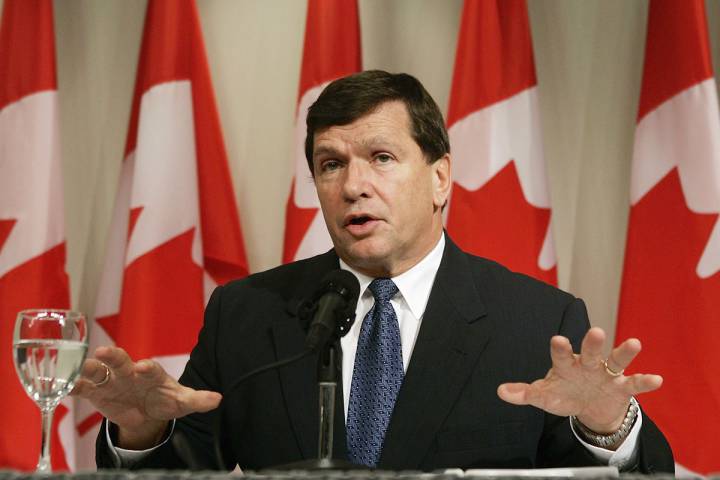Twenty years ago Friday, Frank McKenna fulfilled a promise and resigned as New Brunswick premier, exactly one decade to the day after he took power.

He did not, however, leave the public stage.
Instead, he has carved out a new role – a sort of “premier emeritus” who both cheerleads for the Maritimes and offers harsh truths about its economic malaise.
“He’s candid. He says what’s on his mind and he has a very good mind. He has never forgotten New Brunswick and has never forgotten his roots,” said Nova Scotia MP Scott Brison, president of the federal Treasury Board.
Brison said it’s no surprise that McKenna continues to speak out on public policy – and that people want to listen.
On Wednesday night, he was in Halifax, speaking on trade and immigration at the Atlantic Institute for Market Studies.
When Energy East died last week, there was McKenna – on BNN, CTV and elsewhere, saying the Maritimes were “royally steamed at losing out of being part of the national dream with all of those jobs and opportunity.”
The 69-year-old deputy chairman of Toronto-Dominion Bank has pushed for greater immigration as an antidote to a declining population base, and warned about “alarming levels” of government debt in New Brunswick.
“Our destiny is looking increasingly desperate. A tsunami is coming and the early waves are starting to hit our shore. It is not hyperbole to say that we are literally facing an extinction event if we do not take action,” McKenna said in a November 2015 speech.
In an interview, McKenna said he tries to “pick my spots,” and usually talks to current leaders before he speaks out. But he wants the region to have some needed conversations.

Get daily National news
“I just feel that I’ve had enough experience and knowledge that I can contribute to the debate and at least provoke the debate,” said McKenna, who lives in Toronto but maintains a vacation property in his home province.
“I do think it’s helpful for all of us who have left public life to maintain an interest and be part of the debates. We should have learned something from our mistakes, if not our successes and we should be able to pass that on.”
Don Desserud, a political scientist at the University of Prince Edward Island who closely follows New Brunswick politics, said “premier emeritus” is a good way to describe McKenna.
“He has a very strong reputation for being a clear speaker, a clear thinker, a person with a lot of integrity, a lot of intelligence. Not everyone agrees with Frank McKenna’s take on economic and political issues, but everyone agrees that he brings thought to it, and brings a sincerity that the public craves,” Desserud said.
WATCH: Frank McKenna puts US Ambassador on the defensive
“You always got the sense that he believes strongly that New Brunswick could succeed, that Canada should succeed, and that everything he said was designed to help and bring some level of greater prosperity to the province and the region of the country.”
McKenna was born in rural Apohaqui, N.B. He established a successful law practice in Chatham, N.B., before entering provincial politics in 1982. Three years later he became Liberal leader, and on Oct. 13, 1987, the party captured all 58 seats in the legislature.
READ: Refugees should spend 3 years in Atlantic Canada before getting citizenship: former N.B. premier
He quit a decade later, later serving as Canada’s ambassador to the United States and making his mark in business and banking. He has served as chairman of CanWest Global, and on the boards of Noranda, Shoppers Drug Mart and General Motors. He is currently chairman of Brookfield Asset Management
McKenna would likely have been the front-runner for the federal Liberal leadership in 2006, but chose not to run in the race to replace Paul Martin. Donald Savoie, a Moncton professor and author, said McKenna would have likely become prime minister had he run.
But Savoie said his friend has carved out a valuable role for himself in his political retirement.
WATCH: Link citizenship for immigrants to residence in Atlantic Canada: McKenna

“His commitment to the province is still as strong as when he was first elected,” said Savoie, Canada Research Chair in Public Policy and Governance at the University of Moncton.
“He’s still not only saying things, but also doing things. He’s moving TD jobs to New Brunswick, being front and centre on the pipeline debate. There’s no question that his heart is in New Brunswick,” Savoie said.
In May, McKenna announced plans for a new TD call centre in Moncton – the bank’s second in the province – that the New Brunswick government said would create up to 575 full-time jobs.
“Every day I work on projects that will be good for our region. Even within TD Bank we’ve been able to bring jobs this way and would like to bring more,” McKenna said.
“I really enjoy what I do now. I have a lot of freedom to become involved in humanitarian issues and political issues at various levels that I find very stimulating and I love doing it.”







Comments